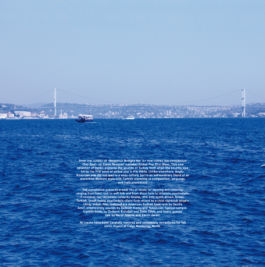

September 26, 2013, General Public, Berlin
Global Pop First Wave
A Corvo Records sublabel
presents its first release: Saz Beat
Saz Beat. Turkish Rock, Funk, and Psychedelic Music of the 1960s and 1970s
From the curator of “Bosporus Bridges Vol. 2,” now comes the compilation “Saz Beat” on Corvo Records’ sublabel Global Pop First Wave. This new selection of tracks explores the sounds of Turkey from when the country was hit by the first wave of global pop in the 1960s. Unlike elsewhere, Anglo-American pop did not lead to a copy culture, but to an extraordinary blend of an electrified Western style with Turkish elements in composition, language, and instrumentation.
The compilation presents a wide mix of music for dancing and listening, ranging from hard rock to soft folk and from disco funk to muezzin psychedelic. It contains two incredible tunes by Grazia, “the only synth-driven, Israeli-Turkish, break-heavy, psychedelic-disco-funk record by a child nightclub singer” (Andy Votel). Also featured are American-Turkish beat rock by Devil’s Anvil, otherworldly sounds by Gülsüm Kamu and Yabancılar, hiphop-sample-friendly beats by Özdemir Erdoğan and Zafer Dilek, and heavy groove folk by Meral Atakök and Zerrin Zeren.
All tracks have been carefully restored and completely remastered for full sonic impact at Calyx Mastering, Berlin.
A
01 Grazia – Olmek Var
02 Devil’s Anvil – Shisheler
03 Grazia – Soyle Beni
04 Gülsüm Kamu & Ergun Özer Orkestrasi – Aliyi Gördüm Aliyi
05 Özdemir Erdoğan – Gurbet
B
06 Dün Bugün Yarın – Kara Tren
07 Zerrin Zeren ve Kupa Dörtlüsü – Tatli Dile Güler Yüze
08 Meral Atakök – Masa Üstünde Testi
09 Yabancılar – Ağıt
10 Zafer Dilek – İşte Hendek, İşte Deve
“Saz Beat” on Global Pop First Wave
A Corvo Records sublabel
CGPFW 001 LP, vinyl edition strictly limited to 500 copies worldwide
Complitation: Holger Lund
Cover & Font Design: Barbara Stehle
© 2013
Release: End of August, 2013
Release event in cooperation with fluctuating images & General Public September 26, 2013.
More information and listening examples:
http://corvorecords.de/global-pop-first-wave/saz-beat-i/
The LP is sold out.
Read review on nonpop:
http://www.nonpop.de/nonpop/index.php?mkey=VARIOUS-Saz-Beat&type=review&area=1&p=articles&id=2528
Read review on psychemusic.org:
http://www.psychemusic.org/turkey2.html#anchor_227
Corvo Records was founded in 2010 in Berlin. The label is releasing experimental turntable music, free improvisation, sound art, and electro-acoustic compositions on vinyl. The releases are striking for their sound-object like character, as well as for a high quality standard in mixing and packaging. The visual and haptic aspects of Corvo Records products are very important and for getting the best result, particular techniques and materials are used.
For more information on this kind of music please listen to:
CTM#21, Saz Beat, on reboot.fm:
http://soundcloud.com/rebootfm/ctm-2
http://reboot.fm/2013/09/21/ctm-21/
and to byte.fm:
http://www.byte.fm/sendung/hidden-tracks/2013-11-06
See also:
Anatolian Rock – Phenomena of Hybridization
Holger Lund
Turkish rock, funk and pop music of the 1960s and 1970s is very little known outside Turkey, though its special aesthetic is worth to be considered. It is sung mainly in Turkish, using traditional musical structures but played with an electrified and electronic instrument setting that combines Western pop-rock instruments with old Turkish ones. Due to the media technology used and their interest in following traditions and doing experiments at the same time, Turkish musicians and producers built up extraordinary hybrids blending western and oriental cultures. In my lecture I will try to analyse this approach including its cultural and political dimensions.
Anatolian rock – what does it sound like? Why does it sound the way it sounds? How has it started and how can this music be contextualized? These are some simple questions I try to follow in my lecture.
The term “Anatolian Rock” was invented by Turkish musicians in the late 1960s as a brand to promote their music. It is a very general term, used to describe music derived from both traditional folk music and pop-rock music in a wider sense. What is special about Anatolian Rock is its capacity of building hybrids, covering the whole range from nearly traditional Turkish music, you will not locate elsewhere than Turkey, to a sort of nearly international rock music, which could take place anywhere. This capacity of hybridization has to do with the republican nation building politics of 1923 related to Turkish music, making it so adaptable for a “westernization”.